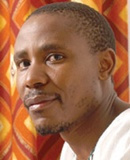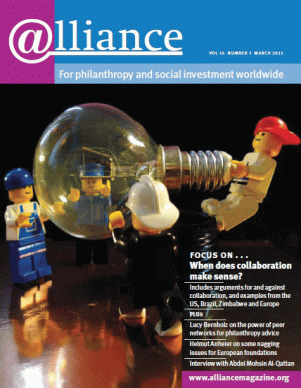Following a decade of economic collapse and political stalemate, the formation of the unity government in Zimbabwe in February 2009 offered an opportunity to rebuild a civil society sector decimated by years of political and economic crises and to set the country on the path to a successful democratic transformation. Time was crucial in seizing the opportunity. A collaborative effort seemed to offer the best framework for a timely response, especially for funders new to Zimbabwe – hence the decision to create the Zimbabwe Alliance.
Relying on our combined strength and capacity, we were able to gather and process information, identify grantees and deploy funds quicker than would have been possible as individual entities. Further, the Alliance, made up of like-minded funders, allowed us to make grants beyond the capacity of any individual organization.
In our experience, the mechanics of collaboration is like peeling an onion. The outside layer that brought us together was a common geographical focus – our shared commitment to make a difference in Zimbabwe. Beyond that, we had to build mutual understanding on multiple layers including on the levels of strategy, process and perspective.
Founding of Zimbabwe Alliance
The genesis of Zimbabwe Alliance lies in one-off collaborative activities among founding members. One of these was when we co-hosted in Washington DC a South African activist, Nomboniso Gasa, during her marathon 21-day hunger strike to raise awareness about the humanitarian crisis in Zimbabwe and the plight of Zimbabwean refugees in South Africa. Cynthia Ryan, principal of the Schooner Foundation, and I, then director of campaigns for Africa Action, had worked together arranging meetings for Nomboniso. Neither of us was new to the Zimbabwe cause: I had been a long-time activist and civil society leader in Zimbabwe before moving to Washington, and the Schooner Foundation already supported Zimbabwe-related initiatives, including the Save Zimbabwe Now campaign that Nomboniso was a part of. Working together on such activities left us seeking ways in which we could have greater impact at what we saw as a historical juncture for Zimbabwe and provided the inspiration for the Alliance.
Through Africa Action’s advocacy work we had established the Zimbabwe Solidarity Forum, which allowed leading Zimbabwean activists and civil society organizations to regularly brief the US-based solidarity community on the latest developments in Zimbabwe and the needs of groups working on the ground. We constantly heard stories of how groups were working with few or no resources. Activists spoke of how they would walk for hours just to attend a meeting because they had no bus fare and we wondered why funders were not putting money into Zimbabwe at a time when there was real potential that the country could be turned around. We were also struck by the fact that some groups, particularly community-based/grassroots organizations, cultural activists and youth, were not served by available resources.
We therefore decided to convene a roundtable of funders and a few advocacy organizations to specifically discuss ‘the challenges and opportunities of funding in Zimbabwe’. The Wallace Global Fund hosted a dozen funders in Washington for this preliminary discussion. Very importantly, one participant in this initial conversation was TrustAfrica, an Africa-based grantmaking organization with experience of funding in Zimbabwe.
Pooling funds for greater impact
From this initial discussion came the idea of Zimbabwe Alliance as a collaborative framework that would allow us to mobilize new funders for Zimbabwe and collectively leverage limited resources for greater impact. Present members of the Alliance are TrustAfrica, Schooner Foundation, International Development Exchange (Idex), the Fund for Global Human Rights, and the Wallace Global Fund. Of these, TrustAfrica and Idex bring important experience as the two groups with prior experience of funding directly in Zimbabwe before the Alliance. TrustAfrica also serves as the fiscal sponsor and grants administrator.
Today, Zimbabwe Alliance has developed into a funder/advocacy collaborative in which members pool a diverse set of resources, including funds, advocacy capacity, intellectual and analytical capital and contacts, to coordinate strategy and enhance impact.
A shared strategy for grantmaking
 In the Zimbabwe Alliance model, we pool funds from donors and give out grants to identified groups through TrustAfrica, with TrustAfrica matching the grants up to a certain limit. This requires that we develop a shared strategy. This is, for us, the second layer of the onion. Building consensus on this level requires work. Fortunately, it has not been too difficult because all Alliance members share the view that the key to a democratic transformation and securing social and economic rights in Zimbabwe is a vibrant civil society. Our support is therefore aimed primarily at civil society as the principal agent for change. Further, in creating Zimbabwe Alliance we wanted to serve traditionally marginalized yet crucial groups such as young people, cultural activists, women and community-based/grassroots organizations.
In the Zimbabwe Alliance model, we pool funds from donors and give out grants to identified groups through TrustAfrica, with TrustAfrica matching the grants up to a certain limit. This requires that we develop a shared strategy. This is, for us, the second layer of the onion. Building consensus on this level requires work. Fortunately, it has not been too difficult because all Alliance members share the view that the key to a democratic transformation and securing social and economic rights in Zimbabwe is a vibrant civil society. Our support is therefore aimed primarily at civil society as the principal agent for change. Further, in creating Zimbabwe Alliance we wanted to serve traditionally marginalized yet crucial groups such as young people, cultural activists, women and community-based/grassroots organizations.
All members of the Alliance serve on the steering committee, which gives strategic direction to the Alliance and makes decisions based on consensus. While there is inevitably an unequal power dynamic between non-funders and funders and between funders of different size, we have minimized this by giving an equal voice to everyone at the table.
A smaller set of members anchored by the Wallace Global Fund and TrustAfrica serve as the management committee, which brings key issues and recommendations to the attention of the steering committee for deliberation and decision-making and works with a coordinator to implement the decisions of the steering committee.
Achievements so far
To date, Zimbabwe Alliance has been able to support key actors on crucial processes for the democratization and rebuilding of the country, including the ongoing constitutional reform process. This includes support for:
- facilitating the coordination of strategies by CSOs and monitoring and reporting on the constitutional reform process;
- cultural activists using arts and culture to empower young people for participation in processes affecting their communities and nation;
- community organizing around local issues;
- social and economic rights advocacy;
- democratizing local government and community participation in service delivery issues;
- diaspora re-engagement for participation in the country’s reconstruction and democratization;
- advocacy on US policy towards Zimbabwe.
Developing a shared perspective
Beyond agreeing the strategy and groups to support, we have to continuously invest time in developing a shared perspective on the nature and dynamics of the crisis in Zimbabwe – this is especially important given the acute polarization and hotly contested nature of the crisis. We constantly gather and process information from a wide cross-section of people on the ground, including CSOs, funders, diplomats, policymakers, government and parliamentary representatives, in order to develop a shared perspective. This shared learning and understanding of the context is an important layer in sustaining the collaborative. For us it is the third layer of the onion.
The challenges
Zimbabwe Alliance collaborative work came as new, unbudgeted work on top of what for many of us was an already full plate. By its very nature, collaborative work requires a great deal of time. Coordinating groups with different mandates and balancing the time and staff required for the collaborative and individual organization’s work has been a real challenge, which has led to some of our original members dropping out.
There is also a cultural or systems clash that happens in a collaborative because of members’ diverse backgrounds. This is revealed in many ways: for instance a more deliberative approach to an issue in contrast to an expeditious one, inevitably creating a sense of one party feeling rushed and another feeling slowed down. One will want to make larger grants, another smaller ones; different partners will have different views on engaging grantees, and so on. Reconciling these differences in approach and reaching agreement can be a real challenge and requires good facilitation.
We also learned that a collaborative is vulnerable to instability in a key member organization, for example if that organization suffers a serious internal crisis, especially if it holds key responsibilities. A lot of time, momentum and credibility can be lost because of problems at a member organization.
Is it worth it?
Notwithstanding the challenges, the collaborative effort has been worth it for us. The Alliance has created a safe space for shared learning, devising a common strategy and pooling funds and other resources in order to enhance impact. 2011 is a watershed year for Zimbabwe; a referendum on a new constitution is expected by the middle of the year to be followed by a general election. With our experience and evolution over the past two years, Zimbabwe Alliance offers a collaborative framework for funders who want to get into the game on time and make a difference in this historic year and beyond.
Briggs Bomba is Zimbabwe Alliance coordinator. Email briggs@zimbabwealliance.org
For more information
http://www.zimbabwealliance.org
 Bhekinkosi Moyo
Bhekinkosi Moyo
As early as 2007, TrustAfrica began responding to the political and economic crises in Zimbabwe through projects that sought to strengthen the vibrancy of civil society and its capacity to respond to those crises. So when Zimbabwe Alliance was born, it made sense for us to collaborate with it for a number of reasons. First, to avoid duplication of effort. Second, it was in line with TrustAfrica’s approach of collaboration, dialogue and consultation. Third, it further bolstered what we were already doing in Liberia – another post-crisis country – where we collaborate with Humanity United to strengthen civil society to contribute towards the reconstruction of Liberia.
We saw ourselves playing a critical function in Zimbabwe Alliance. Because of our existing projects in Zimbabwe, we brought knowledge, experience and political consciousness. In addition, TrustAfrica’s staff – from operations, grantmaking and programming – are all involved in the identification and implementation of projects. The Zimbabwe Alliance would thus benefit from a low overhead and be able to disburse most of the resources to its civil society grantees, as TrustAfrica staff are already covered by our core funding. TrustAfrica has also developed and expanded its internal systems so that the Alliance can be assured that its resources are in good hands and will be disbursed after rigorous due diligence.
In addition, TrustAfrica’s pan-African reach means that it has developed networks across the continent which help provide the necessary solidarity, movement building and partnerships to deal with politically charged situations. Finally, TrustAfrica attempts to match in part the resources from Zimbabwe Alliance, financially and in kind.
Perhaps it is too early to say definitively whether the collaboration has been worthwhile, but the signs are that it has. We have pooled resources, and indications are that more members will join and increase the grantmaking budget. Like all other collaborations, we had to learn about our individual and organizational cultures, approaches and principles: what to compromise and what not to compromise; what to prioritize and what to leave for later. In many ways, it has been an opportunity to deepen our understanding of ourselves, particularly of our identity and principles.
Being part of Zimbabwe Alliance has also enabled us to tighten our Zimbabwe projects and connect all our partners there under the banner of the Alliance. And if the political climate worsens, we have a network through which we can build a stronger resistance. Only partnerships and collaborations have the potential to address the underlying causes of political and economic malaise in a country like Zimbabwe. And civil society is key to such an intervention.
Bhekinkosi Moyo is programme director of TrustAfrica. Email moyo@trustafrica.org
 The Zimbabwe Alliance – a donor’s perspective
The Zimbabwe Alliance – a donor’s perspective
Cynthia Ryan
In January 2009, when my colleague Kumi Naidoo went on a 21-day hunger strike in solidarity with the people of Zimbabwe, who were starving because of the whims of their political leadership, I wanted to lend my support. As the head of a foundation that focuses internationally on human rights and peace and security, I arranged for a small grant to the coalition organizing these efforts, but I wanted to do more. This led to hosting the visit of Nomboniso Gasa to the US, as Briggs Bomba describes in his article. As he goes on to remark, it stimulated both of us to begin thinking about the relative lack of donor interest in civil society in Zimbabwe.
Over the last two years we have had both setbacks and successes, but if someone were to ask was the collaboration worth it, the answer would be a resounding yes. The positives for the Schooner Foundation have been both practical and philosophical. As a small, family, US-based foundation we had neither the staff to do the due diligence required to understand the complexities of the ever-changing situation on the ground, nor the means to find the best local organizations doing the work, nor the mechanism to fund groups not registered as US 501(c)(3)s. The various partners in the Alliance would solve these issues for us, but, more importantly, our participation would greatly leverage our commitment of $50,000 a year for three years.
However, there are wonderful intermediary groups that we could probably have found to facilitate this. For us the heart of the Alliance was a chance to be part of a collaboration that was consciously and deliberately trying, if not to erase, at least to minimize the power dynamic between large and small funders, donors and NGOs, western voices and those from Africa. We wanted to put into practice our belief in giving equal voice to all, trusting and respecting other points of view, and working as a group to find consensus on strategies and methodologies.
As funders we often ask grantees to collaborate but we don’t often tackle the challenges ourselves. But it’s important that we should do so. The time commitment is considerable, especially at the beginning. The delegation of responsibilities is often not evenly distributed, with the bulk of the work falling to a few. We learned that it was necessary to have a paid staff person managing logistics and communications, and being the link between different partners. We learned a difficult lesson when a crisis at one of the founding partner organizations affected several other members.
But a collaboration adds great value in addition to the actual cash grants. The benefit of having different actors with their own perspectives sharing ideas, tactics and strategies balances out the sometimes difficult process of letting go of total control over how the money will be spent. In that process, trust and respect for others with different viewpoints is fostered and developed.
Cynthia Ryan is principal of the Schooner Foundation. Email cryan@schoonercapital.com
Postscript from Cynthia Ryan, Zimbabwe, 21 January
I have been in Zimbabwe now for five days in both Harare and Bulawayo. Nothing replaces experience on the ground. I have been able to learn an enormous amount in a short period of time that I can now share with other members of the Alliance and the broader donor community such as members of the African Grantmakers Affinity Group and International Human Rights Funders Group.
There is a vibrant and active civil society in Zimbabwe but there are gaps and immediate needs. We must seek out ways to encourage women to participate more fully in civil society by supporting women-led organizations and those that focus on gender and women’s empowerment. There is a clear need for resources that go beyond the financial that the Alliance can and should address: capacity building, IT training, convening dialogues between different sectors and communities, fundraising workshops, policy and economic analysis to be used for advocacy, dissemination of information. These are just some of the areas we have identified where we can do more than help individual organizations but instead raise the tide for all boats and help the broader movement achieve its goals.
Not only has my trip generated many new ideas, it has also enabled Briggs and me to tell the community about the Zimbabwe Alliance, put faces to the names, and show our solidarity in the struggle. We are actively forming a community and that is a very fulfilling experience for me both as a funder and as a global citizen. Not only is there power in numbers; there is peace in numbers.


Comments (0)